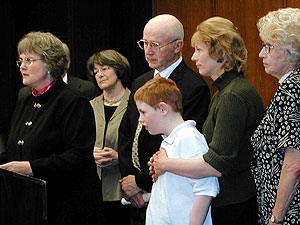Audio
Photos
More from MPR
Your Voice
| |||||||||||||||||||||||||||||||||||||||||||||||
Session ends, spin begins
May 30, 2003
Less than 12 hours after the Legislature brought a special session to a halt, finishing its work for the year, Republicans and Democrats hit the road Friday to recap what happened during their 2003 gathering. Before ending the session, lawmakers passed a $7.2 billion health and human services bill. Democrats voted against it, calling it "the meanest" of the Republican budget bills.
St. Paul, Minn. — No matter who was delivering the message, it was likely to sound similar: A lot happened, especially in the final days.
"We've done our job," House Speaker Steve Sviggum said.
|
What this bill does is change the name of MinnesotaCare from MinnesotaCare to Minnesota Used to Care. We don't care anymore.
- Rep. Tom Huntley |
In a frenetic final day, first out of the chute was a $7.5 billion health and human services bill that makes up roughly a quarter of the state's total budget.
The funding bill for health and human services programs was perhaps the most difficult to reconcile because it cuts more than $1 billion from services for the disabled, poor and families.
The House voted 78-to-54 for the bill, which includes funding for health care programs, nursing homes, child care and welfare. The Senate passed it 34-28, with Democrats providing the minimum number of votes to pass it, upholding an agreement among Capitol leaders.
The bill reduces eligibility and increases co-pays for Minnesota Care, the state's subsidized health insurance program. DFL Representative Tom Huntley of Duluth says more than 18,000 Minnesotans will lose state health coverage under the bill, including 14,000 children.
"What this bill does is change the name of MinnesotaCare from MinnesotaCare to Minnesota Used to Care. We don't care anymore," he said.
Republicans say DFLers are scaring people with inaccurate numbers. They say the actual number of children losing health coverage will be far smaller. The bill's sponsor, Rep. Fran Bradley, R-Rochester, says the bill increases state spending on health and human services, and attempts to rein in rising health care costs.
"We do have a responsibility to the taxpayers. We are increasing investments through these programs somewhere between 10 and 15 percent to the next biennium. We simply cannot sustain 22 to 23 percent increases biennium to biennium, and that's exactly where we were headed," according to Bradley.
The bill also:
 | |||
-Makes more than $86 million in cuts to child care services, changes that will immediately push about 1,200 families off state subsidies and eventually decrease the number of people eligible by about 40 percent.
-Cuts $104 million from General Assistance Medical Care, the state's health care program for the lowest income people. Berglin said it eliminates outpatient care for thousands, meaning people with mental illness, for example, may have to go to hospital emergency rooms to get their medications.
-Requires welfare recipients who are enrolled in educational programs to also work at least 20 hours per week.
-Requires people who pay their own way in nursing homes to pay $1,800 more per year as a side effect of a plan to try to get more federal matching funds.
-Saves $35 million by eliminating health coverage for undocumented non-citizens except for pregnant women.
-Allows the state to completely eliminate cash welfare grants for families that don't abide by work requirements.
-Steers new welfare applicants into an intensive job search program for four months before they receive cash payments.
-Cuts about 15 percent from Meals on Wheels, foster grandparent programs and other senior volunteer efforts, totaling nearly $6 million.
Republicans say the bill protects funding for the elderly and disabled. Rep. Jim Abeler, R-Anoka, says the House staved off efforts by the governor and Senate to cut nursing home reimbursement rates.
"We prevailed, and the nursing homes are going home today with their funding intact. And I think that's a tremendous victory for the people who we care about as a House, and I think that we were negotiating on behalf of all of us here that that was a high priority that we held," he said.
While the bill maintains nursing home rates, private pay nursing home residents could pay an additional $1,800 a year. The bill also cuts senior nutrition and volunteer program grants by 15 percent. It cuts hospital reimbursements by five percent.
While hospitals aren't thrilled with the bill, they say they're glad the state maintained General Assistance Medical Care.
As the House was debating the bill, Senate Democrats held a news conference to call it a "ruthless dismantling of Minnesota's safety net." The lead Senate negotiator on the bill, Minneapolis DFLer Linda Berglin, says the bill cuts programs that save the state money by keeping people out of hospitals and moving them from welfare to work.
"This bill dismantles many, many things that have been done over the years to save money in the long run. And it's not about programs that I created or I worked on. It's about a way of life for the state of Minnesota," she said.
Standing next to Berglin was Sue Klingenberg of St. Paul, who stays home to care for her 11-year-old son Michael, who is severely autistic. Klingenberg says under the bill, she will lose $150 a month in state assistance.
"We're just getting by now, by our fingernails, and the one I'm worried about is him. He's not getting what he needs now and he certainly can't go with less."
Democrats also criticized cuts to child care funding, family-planning services and day treatment for people with mental illness.
In his end-of-session statement, Pawlenty said, "By living within our means and enacting a wide range of reforms, the difficult decisions made this year will hopefully return Minnesota to a stable budget and pave the way for future initiatives to further enhance our quality of life."
The Associated Press contributed to this report
|
News Headlines
|
Related Subjects
|


